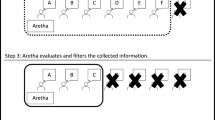Abstract
Edward Craig and Michael Hannon agree that the function of knowledge is to enable us to identify informants whose word we can safely take. This requires that knowers display a publicly recognizable mark. Although this might suffice for information transfer, I argue that the position that emerges promotes testimonial injustice, since the mark of a good informant need not be shared by all who are privy to the facts we seek. I suggest a way the problem might be alleviated.
Similar content being viewed by others
Notes
It is common to speak of such informants as reliable. I use the term “dependable,” because, as I will argue below, reliability is not enough to serve our epistemic purposes.
Craig neglects Gettier cases as they do not bear on the issues he wants to investigate. I will follow him, and temporarily accept his reliabilist stance.
Here, I treat all three terms as epistemically equivalent. I introduce them all, because the linguistic peculiarities of English make certain constructions involving each of them infelicitous. E.g., although we can say that someone who knows is a knower, we cannot say that someone who is aware is an awarer. We need another term. For that, I switch to “cognizer.”
In this paper, I tend to portray Craig and Hannon as speaking with a single voice. I do so because they largely agree on the topic that is my focus. Nevertheless, I should acknowledge that Hannon’s work extends and deepens the function-first approach that Craig introduced, and eliminates some problematic aspects of Craig’s position.
I owe this term to Hannon who was once charged with this offense (see Hannon 2019, p. 44).
Hannon waters this down, after objectivization to “recognizable in principle” by someone or other (2017, p. 37). This may yield a concept of knowledge, but it seems to divorce that concept from the function of providing access to good informants. I will say more about objectivization below.
I suspect that something less will do. A good informant should be able to supply information that is true enough for current purposes—that is, that comes close enough to the truth in the respects that currently matter. Such information, if it is not true, would not amount to knowledge (see Elgin 2017). To avoid fighting on too many fronts at once, I will for the purposes of this argument grant that good informants are privy to the exact facts we seek.
Over time, this changed. Commoners’ expertise came to be acknowledged, initially only when gentlemen vouched for them. Eventually, their lack of suitable social standing was overridden by their obvious scientific expertise. The conviction that members of the Society could not challenge one another also waned. First, theoretical claims were deemed merely probable, and it was considered acceptable to challenge merely probable claims. Later, human fallibility was recognized to afflict everyone. Then challenging another member’s findings was not seen to be impugning his moral or intellectual character.
Although the film is a fiction, Will is obviously modeled on Ramanujan, who was, for reasons of ethnicity and education, an equally unpromising math informant.
I am grateful to an anonymous referee for reminding me of this passage.
“Presumptively,” since the recipient might have other commitments which call the information into doubt.
References
Chamorro-Premuzic, T. (2019). Why do so many incompetent men become leaders? Harvard Business Review: Press.
Coffman, K. B. (2014). Evidence on self-stereotyping. Quarterly Journal of Economics, 129(4), 1625–1660.
Craig, E. (1990). Knowledge and the state of nature. Oxford: Clarendon Press.
Craig, E. (2007). Genealogies and the state of nature. In A. Thomas (Ed.), Bernard Williams (pp. 181–200). Cambridge: Cambridge University Press.
Dancy, J. (1992). Review of knowledge and the state of nature. The Philosophical Quarterly, 42(186), 393–395.
Durkheim, E. (2001). The elementary forms of religious life. Oxford: Oxford University Press.
Ehrlinger, J., & Dunning, D. (2003). How chronic self-views influence (and potentially mislead) estimates of performance. Journal of Personality and Social Psychology, 84, 5–17.
Elgin, C. (2017). True enough. Cambridge MA: MIT Press.
Fricker, M. (2009). Epistemic injustice: the power and ethics of knowing. Oxford University Press.
Fricker, M. (2012). Group testimony: the making of a collective good informant. Philosophy and Phenomenological Research, 86, 249–276.
Geertz, C. (1993). Religion as a cultural system. In C. Geertz (Ed.), The interpretation of cultures: selected essays (pp. 87–125). London: Fontana Press.
Hannon, M. (2019). What’s the point of knowledge? Oxford: Oxford University Press.
Hunter, M. (1982). The Royal Society and its members: 1660–1700. British Society for the History of Science.
Itzkoff, D. (2009). A mind-meld Q & a with Leonard Nimoy, Arts Beat, New York Times, May 8.
Kappel, K. (2010). On saying that someone knows: themes from Craig. In A. Haddock, A. Millar, & D. Pritchard (Eds.), Social epistemology (pp. 69–88). Oxford: Oxford University Press.
Shapin, S. (1994). A social history of truth. Chicago: University of Chicago Press.
Williams, B. (1973). ‘Deciding to Believe’, in his Problems of the Self. Cambridge: Cambridge University Press, pp. 136-151.
Acknowledgments
I am grateful to the members of the University of Alabama Department of Philosophy, and to participants in the 2019 Bled Epistemology Conference for helpful discussions of earlier drafts of this paper. I am also grateful to an anonymous referee for useful comments, and particularly for encouraging me to sharpen my terminology.
Author information
Authors and Affiliations
Corresponding author
Ethics declarations
Conflict of Interest
The author declares that she has no conflict of interest.
Additional information
Publisher’s Note
Springer Nature remains neutral with regard to jurisdictional claims in published maps and institutional affiliations.
Rights and permissions
About this article
Cite this article
Elgin, C.Z. The Mark of a Good Informant. Acta Anal 35, 319–331 (2020). https://doi.org/10.1007/s12136-019-00418-9
Received:
Accepted:
Published:
Issue Date:
DOI: https://doi.org/10.1007/s12136-019-00418-9




